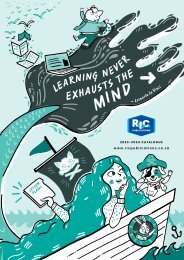20860_Editing_explanations_Years_4_and_5
Create successful ePaper yourself
Turn your PDF publications into a flip-book with our unique Google optimized e-Paper software.
Teacher information<br />
GRAMMAR<br />
Nouns<br />
Nouns are naming words of people, places <strong>and</strong> things; e.g. teacher, school, desk.<br />
Proper nouns name individual people (Bill), places (Kings Park) <strong>and</strong> others (Christmas,<br />
December, Sunday). Proper nouns are written with capital letters.<br />
Common nouns are any other nouns.<br />
Collective nouns are a subset of common nouns; e.g. a team of players.<br />
Pronouns<br />
A pronoun is a word substituted for a noun; e.g. They asked him to help them.<br />
Personal pronouns refer to you, me <strong>and</strong> other people; e.g. I, me, you, she, us, them.<br />
Adjectives<br />
Adjectives modify (enhance or change) the meaning of nouns <strong>and</strong>, less commonly,<br />
pronouns; e.g. parched l<strong>and</strong>; green, fertile l<strong>and</strong>; poor old me; lucky you.<br />
Verbs<br />
Verbs are ‘doing’ words; e.g. swim, like, look.<br />
Auxiliary verbs join other verbs to form verb groups; e.g. have eaten, will be asleep.<br />
Verb tense. There are three basic tenses. Because there are so many irregular verbs in<br />
English, tense can be complex.<br />
regular<br />
irregular<br />
Subject-verb agreement<br />
the past..................... the present.......................the future<br />
played...............................play................................will play<br />
has played.......................plays......................... should play<br />
went.................................. go................................... will go<br />
has gone.......................... goes............................should go<br />
NOTE: The future <strong>and</strong> the past tenses often use auxiliary verbs.<br />
Verbs have to agree with their subjects<br />
The children cheer loudly.<br />
(subject-plural) verb<br />
The child cheers loudly<br />
(subject-singular) verb<br />
Many English verbs are irregular, which can cause problems, particularly for students from<br />
non-English speaking backgrounds.<br />
He is at school.<br />
He was busy.<br />
They are at school.<br />
They were busy.<br />
In some sentences the subject of a verb is separated from the verb <strong>and</strong> not easy to locate.<br />
Students should be encouraged to ask themselves ‘who’ or ‘what’ before the verb.<br />
Adverbs<br />
‘The boy, although really late for school <strong>and</strong> likely to get into trouble, dawdled.<br />
‘dawdled’ is the verb.<br />
‘The boy’ is the subject. (‘Who dawdled?’)<br />
Adverbs are words that modify (enhance or change) the meaning of verbs.<br />
He ran quickly.<br />
There are adverbs of:<br />
I’ve seen this before.<br />
time........................e.g. yesterday<br />
place......................e.g. downstairs<br />
manner...................e.g. carefully<br />
x <strong>Editing</strong> skills R.I.C. Publications ® www.ricgroup.com.au


















